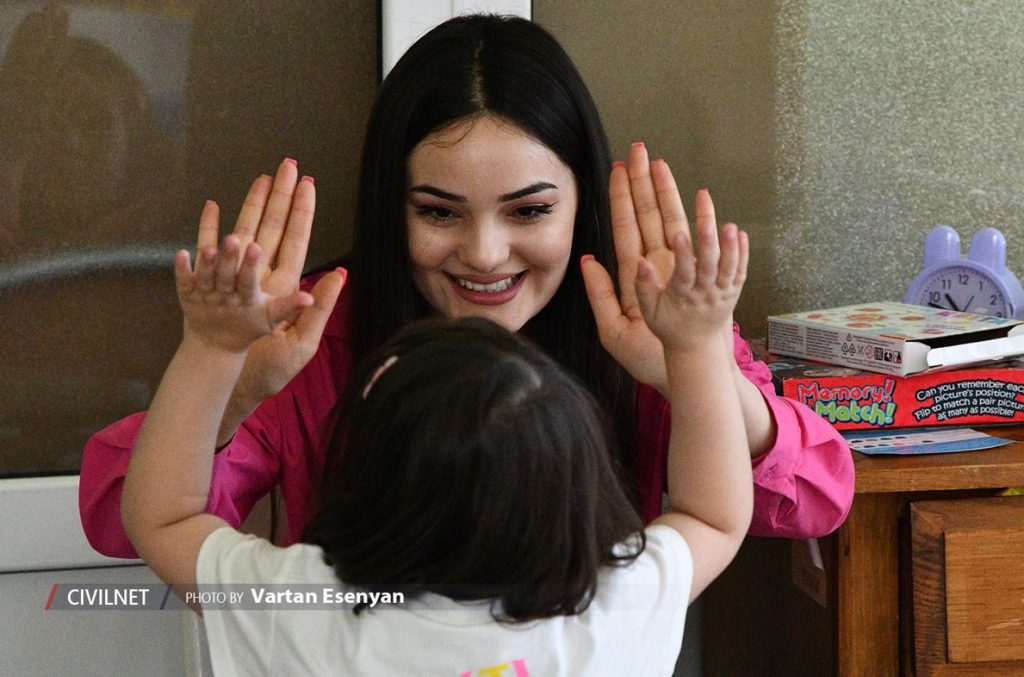By Vartan Esenyan
In a world that often overlooks the silent struggles of children with special needs, there are few non-governmental organizations that stand out as a beacon of hope to Armenian families who are able to overcome their hurdles. One of such facilities is nestled in the heart of Ararat region. It’s not just a place of care, but a sanctuary where miracles unfold daily.
Recent statistics indicate that 30,000 children were among 100,000 refugees who fled the ethnic cleansing in Nagorno-Karabakh. This significant influx has placed additional pressure on Armenia’s resources and infrastructure, especially for children with special needs. The sector is led by the Ministry of Labor and Social Affairs overseeing the Social Protection services and the Division for Persons with Disabilities. In Armenia, important NGOs fill in the gap where needed, since Ministry of Health and Education resources are scarce.
Historically, Armenia has faced significant challenges in providing adequate services and support for children with special needs. The legacy of Soviet-era institutional care and stigma towards disabilities has been a significant barrier to integration and inclusive education. In recent years, efforts have been made to shift towards community-based care and inclusive education, but progress has been slow and uneven. According to UNICEF, around 8,000 children in Armenia have some form of disability. However, this number is likely underreported due to social stigma and inadequate diagnostic practices.
“Every child deserves a chance to shine, no matter their challenges,” says Naira Manukyan, Senior Caregiver and Musical Therapist at For You NGO located in the heart of the little town of Masis in the Ararat region.
Intellectual disabilities, autism spectrum disorders, cerebral palsy, and various sensory impairments are the most common disabilities among children in Armenia.
As of recent reports, approximately 4,000 children with disabilities are enrolled in special education institutions, while around 2,000 are integrated into mainstream schools with varying levels of support
Access to specialized healthcare and rehabilitation services remains limited, particularly in rural areas. Many families have to travel long distances to access necessary services. There are a few specialized centers, such as the Arabkir Joint Medical Center and Institute of Child and Adolescent Health, that provide comprehensive services for children with disabilities. In the Ararat region the For You NGO serves the towns of Masis, Ararat, Vedi and Artashat that have a combined of 212 high schools, 77 kindergartens and 4 colleges according to director Ms. Gayane Balasamyan who founded the For You NGO in 2002.

Gemma Ghazarian was hit with cerebral palsy at a young age and her temper was out of control, bursting in rage, crying and screaming for hours. Such an outpour of strong emotions made her mom feel hopeless and helpless. “Gemma’s experience in the center with the caregivers were at best horrible during the first few weeks and her mom was at the point of giving up,” says Therapist Ani Sarksyan. Three years later, Gemma’s condition miraculously improved and she became an amazingly talented young lady who now sings solo in the choir. She no longer needs coaching, she paints with gouache paint and lives a normal social life.
Sarah, a refugee from Karabakh, had arrived with deep emotional scars, suffering from a severe hearing impairment. Today, thanks to the center’s innovative therapies and the unwavering support of her caregivers, she is doing much better.
Employees at For You NGO often work long hours and experience burnout. They experienced a wide range of emotions, from joy and fulfillment to frustration and despair. The constant need to be vigilant and responsive to the child’s needs created a perpetual state of stress and anxiety.
The physical aspect of caregiving involves tasks that can be physically exhausting, such as lifting and moving the child, managing medical equipment, and performing daily care routines. This consequently led to fatigue and physical strain.

NGOs’ impact extends beyond the children they serve. They play a vital role in the family dynamics in a child’s development, where a robust support to parents, through counseling sessions and parenting workshops is given. Families are equipped with the tools to navigate their unique challenges. Moreover, community outreach programs and educational initiatives foster a sense of unity and collective responsibility.
Despite progress, social stigma remains a significant barrier. Many families are hesitant to seek help or disclose their child’s disability. Schools and public facilities often lack the necessary infrastructure to accommodate children with physical disabilities. There is a need for more trained professionals, including special education teachers, therapists, and psychologists, to support the growing number of children identified with special needs. While there are progressive laws and strategies in place, their implementation at the local level is often inconsistent and underfunded.
Recent initiatives have focused on increasing awareness and training professionals to provide better support for children with disabilities. Programs aimed at integrating children into mainstream education and community life are gradually expanding, but there is a long way to go to achieve full inclusivity.
















